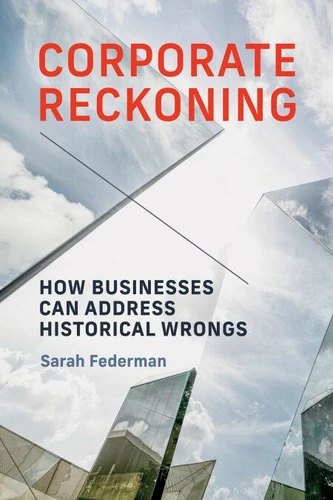Corporate Reckoning. How Businesses Can Address Historical Wrongs
Par :Formats :
Actuellement indisponible
Cet article est actuellement indisponible, il ne peut pas être commandé sur notre site pour le moment. Nous vous invitons à vous inscrire à l'alerte disponibilité, vous recevrez un e-mail dès que cet ouvrage sera à nouveau disponible.
Disponible dans votre compte client Decitre ou Furet du Nord dès validation de votre commande. Le format ePub protégé est :
- Compatible avec une lecture sur My Vivlio (smartphone, tablette, ordinateur)
- Compatible avec une lecture sur liseuses Vivlio
- Pour les liseuses autres que Vivlio, vous devez utiliser le logiciel Adobe Digital Edition. Non compatible avec la lecture sur les liseuses Kindle, Remarkable et Sony
- Non compatible avec un achat hors France métropolitaine
 , qui est-ce ?
, qui est-ce ?Notre partenaire de plateforme de lecture numérique où vous retrouverez l'ensemble de vos ebooks gratuitement
Pour en savoir plus sur nos ebooks, consultez notre aide en ligne ici
- Nombre de pages232
- FormatePub
- ISBN978-0-262-05377-8
- EAN9780262053778
- Date de parution21/04/2026
- Protection num.Adobe DRM
- Infos supplémentairesepub
- ÉditeurThe MIT Press
Résumé
How corporations can address legacies of historical oppression in ways that are good for them and good for others. Increasingly, corporate executives find themselves called upon to atone for their predecessors' moral transgressions. While many are prepared to address inherited failed product lines or dysfunctional teams, few know how to handle demands that their enterprise address legacies of mass atrocity such as slavery, genocide, or colonialism.
In Corporate Reckoning, Sarah Federman provides a corporate atonement model for corporate leaders and employees across industries around the world. When survivors and descendants demand reckoning, many corporate leaders initially shirk the responsibilities that follow from these requests. They may claim that history belongs to the historians, that their company's activities were legal at the time, or that too much time has passed.
If it comes to it, courts will rule in their favor, they reassure themselves. Others avoid these issues simply because they have no idea how to address them. Demands for reckoning ebb and flow, but these histories do not disappear. This book offers a way forward that serves companies and those affected by these historical harms. Taking responsibility for irreparable harm is not easy or comfortable.
Despite its dilemmas and difficulties, the only way out is through.
In Corporate Reckoning, Sarah Federman provides a corporate atonement model for corporate leaders and employees across industries around the world. When survivors and descendants demand reckoning, many corporate leaders initially shirk the responsibilities that follow from these requests. They may claim that history belongs to the historians, that their company's activities were legal at the time, or that too much time has passed.
If it comes to it, courts will rule in their favor, they reassure themselves. Others avoid these issues simply because they have no idea how to address them. Demands for reckoning ebb and flow, but these histories do not disappear. This book offers a way forward that serves companies and those affected by these historical harms. Taking responsibility for irreparable harm is not easy or comfortable.
Despite its dilemmas and difficulties, the only way out is through.
How corporations can address legacies of historical oppression in ways that are good for them and good for others. Increasingly, corporate executives find themselves called upon to atone for their predecessors' moral transgressions. While many are prepared to address inherited failed product lines or dysfunctional teams, few know how to handle demands that their enterprise address legacies of mass atrocity such as slavery, genocide, or colonialism.
In Corporate Reckoning, Sarah Federman provides a corporate atonement model for corporate leaders and employees across industries around the world. When survivors and descendants demand reckoning, many corporate leaders initially shirk the responsibilities that follow from these requests. They may claim that history belongs to the historians, that their company's activities were legal at the time, or that too much time has passed.
If it comes to it, courts will rule in their favor, they reassure themselves. Others avoid these issues simply because they have no idea how to address them. Demands for reckoning ebb and flow, but these histories do not disappear. This book offers a way forward that serves companies and those affected by these historical harms. Taking responsibility for irreparable harm is not easy or comfortable.
Despite its dilemmas and difficulties, the only way out is through.
In Corporate Reckoning, Sarah Federman provides a corporate atonement model for corporate leaders and employees across industries around the world. When survivors and descendants demand reckoning, many corporate leaders initially shirk the responsibilities that follow from these requests. They may claim that history belongs to the historians, that their company's activities were legal at the time, or that too much time has passed.
If it comes to it, courts will rule in their favor, they reassure themselves. Others avoid these issues simply because they have no idea how to address them. Demands for reckoning ebb and flow, but these histories do not disappear. This book offers a way forward that serves companies and those affected by these historical harms. Taking responsibility for irreparable harm is not easy or comfortable.
Despite its dilemmas and difficulties, the only way out is through.



